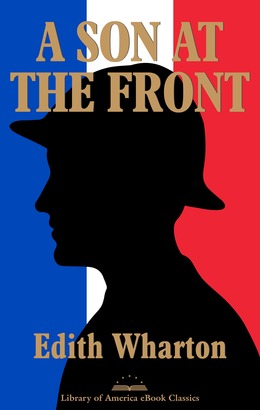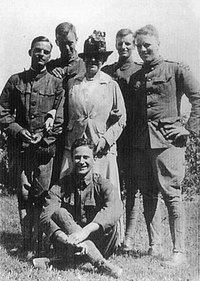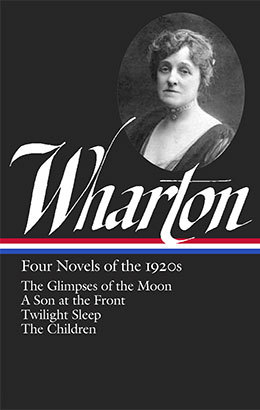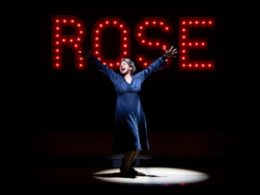Just over a century ago, in October 1917, after months spent transporting troops across the Atlantic, American forces began major combat engagements in Europe. The war had already been raging for over three years and many Americans had long been reporting on the conflict and aiding relief efforts. One of the most visible American civilians during the war’s early years was the expatriate Edith Wharton.
| eBOOK EDITION |
 |
| Edith Wharton: A Son at the Front (LOA eBook Classic) Only $2.99 |
While many of her friends fled France, Wharton remained in Paris and threw her energy into humanitarian initiatives. She established a workroom for women unemployed by the economic disruption; founded American Hostels for Refugees, which aided over 9,000 refugees and for which she raised $100,000 in its first year; and organized the Children of Flanders Rescue Committee, which housed and schooled 750 refugee children, many of them tubercular. “I can’t tell thee how many committees she is chairman of,” one volunteer wrote, “and where she is chairman she does all.”
In the midst of all this, Wharton found the time to make five visits to the front and toured military hospitals to investigate the need for blankets and clothing. And she edited a benefit anthology, convincing (among others) Jean Cocteau, Joseph Conrad, Thomas Hardy, William Dean Howells, George Santayana, W. B. Yeats, Sarah Bernhardt, Henry James, Claude Monet, Pierre-Auguste Renoir, and Igor Stravinsky to contribute. (Wharton translated the non-English works herself.) In appreciation of her activities, she was made Chevalier of the Legion of Honor by the French government and Chevalier of the Order of Leopold by King Albert of Belgium.
 |
| Wharton with five American soldiers in Paris, 1918, including (on the right) Theodore Roosevelt’s sons, Quentin and Archibald. [From As It Was: A Memoir, by Robert M. Pennoyer] |
Soon after the armistice, Wharton proposed to her publisher the idea for a novel that would “describe French and American life in Paris during the first two years of the war.” The editor at her new publisher, Appleton, cabled back, “WAR BOOKS DEAD IN AMERICA.” She finished the book anyway and her previous publisher, Scribner’s, agreed to serialize the novel in its magazine and publish it as a book. Charles Scribner warned, however, that the postwar mood would dampen sales: “Readers who wish something merely entertaining are a little afraid that the book may be too serious or too sad.”
A Son at the Front finally appeared in 1923. Inspired by a young man Wharton met during her war relief work, the novel opens in Paris on July 30, 1914, as Europe totters on the brink of war. Expatriate American painter John Campton, whose only son George, having been born in Paris, must report for duty in the French army, struggles to keep his son away from the front while grappling with the moral implications of doing so. The novel concerns itself not with battles and military operations but instead describes what Wharton herself witnessed firsthand: civilian life during wartime, the relief efforts, and the care and recovery of wounded soldiers.
| HARDCOVER EDITION |
 |
| in Edith Wharton: Four Novels of the 1920s |
The book sold poorly, and the reviews were mixed. One young critic, the soon-to-be-formidable Burton Rascoe, savaged it in the New York Tribune and summarized the prevailing attitude: “If this were the year 1915 or even 1917 instead of the year 1923, Mrs. Wharton’s novel might not seem so profitless an endeavor.” Still, a number of reviewers overcame the general predisposition against war novels and specifically defended the novel against Rascoe’s attack. “So far she has done nothing that equals it,” claimed Maurice Francis Egan in The New York Times Book Review. “There are many reasons why most of us should dislike a novel dealing with the war,” he added pointedly. “Only the production of a masterpiece could reconcile us to the treatment of that terrible epoch by a writer of fiction.” The novel, he argued, and in particular its treatment of the parents, “put Mrs. Wharton in the first rank of modern novelists.” Another reviewer, William Lyon Phelps, agreed: “It must certainly rank high among our novelist’s achievements.”
In recent years a number of writers and critics have argued that A Son at the Front deserves a second look. “The novel—like Virginia Woolf’s Jacob’s Room or Rebecca West’s The Return of the Soldier—has its own integrity as a novel about the Great War without once depicting a battle scene,” writes literary scholar Julie Olin-Ammentorp. “Wharton’s very avoidance of the front may also have contributed to the neglect of her novel.” And a review two decades ago in Publishers Weekly likewise urges reconsideration, calling it “an extraordinarily poignant novel. . . . Wharton movingly portrays those left behind during war—not the wives and children but the devastated parents, who are forced to go on living at the cost of their own flesh and blood. Heartrending, tragic, powerful, this is not to be missed.”



